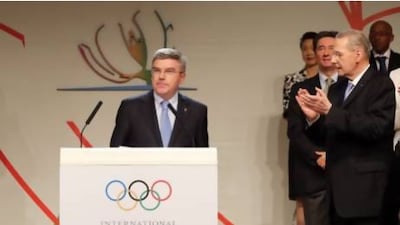BUENOS AIRES // Thomas Bach achieved a long-held dream on Tuesday when he was elected to the most powerful position in sport as president of the International Olympic Committee (IOC), in Buenos Aires.
The German, 59, became the first Olympic gold medallist to become president and won in the second round of voting by his fellow IOC members. He beat his five rivals bidding to succeed Jacques Rogge, who stepped down after 12 years in charge.
Bach, a gold medallist with the West German team in the team foil in the 1976 Olympics, had been the frontrunner throughout the campaign and had for years been seen as the man most likely to replace Rogge.
"I know what the enormous responsibilities are of being IOC president, but I am very happy," he said.
"You, my friends and colleagues, have placed in me an overwhelming sign of trust.
"I also have enormous respect for my fellow candidates and I will work with you. I will put into practise what my motto was during the campaign: 'Unity in diversity'."
Bach, a lawyer, is the ultimate insider, having been a member since 1991, and has been vice-president three times while also heading up the judicial commission.
He has also been one of the leaders in fighting doping, calling for athletes to be suspended for four years instead of the two-year ban in place at the moment.
It had not been smooth sailing for Bach during the campaign, with German media in particular posing questions about his ability to be president.
An academic report that Bach commissioned this summer was released, alleging that, like their then-East German neighbours, West Germany had indulged in systematic doping of athletes.
Bach dismissed claims that he should have known more about what had transpired, then set up an inquiry headed by a retired judge. He said in August that in his time as an athlete, he had never witnessed doping firsthand.
"You heard things and read some stories in the newspapers, that something was going on in different sports," he said.
An unflattering documentary on German television failed to turn up anything that could seriously damage him, while his relations with increasingly influential Kuwaiti IOC member Sheikh Ahmed Al Sabah also seemed to leave him unharmed.
The front page of one Argentinian newspaper last week had a cartoon of Sabah, wearing a T-shirt with Bach's face on it, grinning and with his thumb raised, while rival Denis Oswald went public and slammed him for his business links with Kuwait.
Follow us

